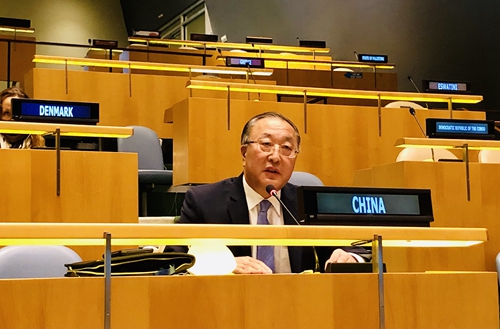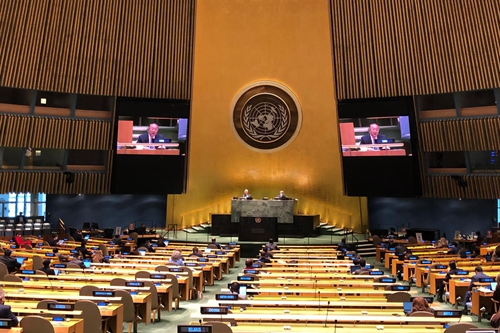| Statement by Ambassador Zhang Jun on Security Council Reform at Plenary Session of the 75th Session of United Nations General Assembly |
| 2020-11-16 01:20 |
|
Mr. President, Thank you for convening this meeting. I wish to congratulate Ambassador Wronecka of Poland and Ambassador Al Thani of Qatar for being appointed IGN Co-Chairs for the 75th Session of the UNGA. They have China’s full support in discharging their responsibilities. Thank you also to Ambassador Nusseibeh of the UAE and Ambassador Wronecka for their contributions as IGN Co-Chairs of the last session. Under their able leadership. IGN has delivered important results despite extraordinary circumstances caused by COVID-19, maintained the continuity of the work, and laid a good foundation for IGN in the following session. Mr. President, We just commemorated the 75th anniversary of the UN. 75 years ago, through hard struggles, people of the world won the great victory of the war against fascism. The UN was then founded, and the architecture of its Security Council established. 75 years on, the Security Council has come a long way in fulfilling its sacred duty provided for by the UN Charted and played an irreplaceable role in the maintenance of international peace and security. China supports the Council in keeping abreast with the times and improving itself through necessary and reasonable reform to better fulfill its duty given by the UN Charter, serve the interests of people of all countries, and enable everyone to benefit from the reform. To do that, the key is to keep the right direction of the reform. Otherwise, the reform will go astray and fail the expectations of member states. The reform must be fair. The collective rise of developing countries is the defining feature of today’s international landscape. The composition of the Council with an over-representation of developed countries does not reflect the reality, which is a main driver for the current round of reform. The only right way to ensure a fair reform is to increase the representation and say of developing countries, especially African countries, and to address the historical injustice suffered by African countries. The reform must feature equality. Countries, big or small, strong or weak, rich or poor, should all be able to benefit from the reform and to be more involved in the Council. Until now, there are still over 60 countries which have never made their way into the Council. Some small and medium sized countries get to sit in the Council just once every five decades. Therefore, the priority of the reform is to allow small and medium sized countries to be more involved in the Council and its decision-making process. The reform must not be conducted at their expense only to meet the selfish needs of some other countries. Otherwise, the reform is not needed by the majority of member states, nor will it meet the expectations. The reform must be consensus-based. The Security Council reform concerns the fundamental interests of each and every UN member states and the long -term development of the UN. Therefore, the principle of consensus through consultation must be observed. Only a consensus-based reform plan can ensure the legitimacy of reform and the authority of the Council, yield results that will stand the test of time and test of history, make the Council’s work more democratic, transparent and efficient, and avoid division and confrontation. Mr. President, According to UNGA decision 62/557, IGN is the only legitimate platform for member states to discuss Security Council reform. China supports IGN in following the right track driven by the member states and having in-depth discussions on the five clusters of key issues in informal plenary UNGA sessions to find a package solution. We need to move the reform forward through IGN and, at the same time, face the reality. Currently, parties still have seriously diverging views on the direction and approach of reform. Judging from past experiences, when conditions are not ripe, rushing into text-based negotiation, merging documents to form a single text, setting artificial timeline and even trying to impose a reform model will not help the healthy development of the reform process, but will only worsen disagreement and confrontation and even throw the IGN off the track. China is firmly against it. IGN program of work should be based on extensive views and consensus. The number of meetings is up to the real needs, not meeting for the meeting’s sake. Due to the complexity and sensitivity of reform issues, China supports the opinion by the PGA and many member states, that in-person meeting remains the top choice for IGN, as in-person meeting can best facilitate candid communication, consensus building and dispel misunderstanding. Web-casting, meeting records, and GA rules of procedures shall not apply to IGN which is not in line with the informal plenary nature of the IGN. Requests otherwise go against GA decision 62/557 and GA’s established practice. The Office of Legal Affairs of the UN has made unequivocal reply on this matter. Currently, the member states should focus on the substantive discussion of the five clusters of key issues. China calls on all parties to demonstrate political will and participate in IGN actively and constructively. China is ready to work with all parties to increase mutual understanding through dialogue and consultation, build consensus, and keep the reform on the right track that serves the common interests of member states and the long-term development of the UN. I thank you, Mr. President.
|
| |||||||||||||
| |||||||||||||

